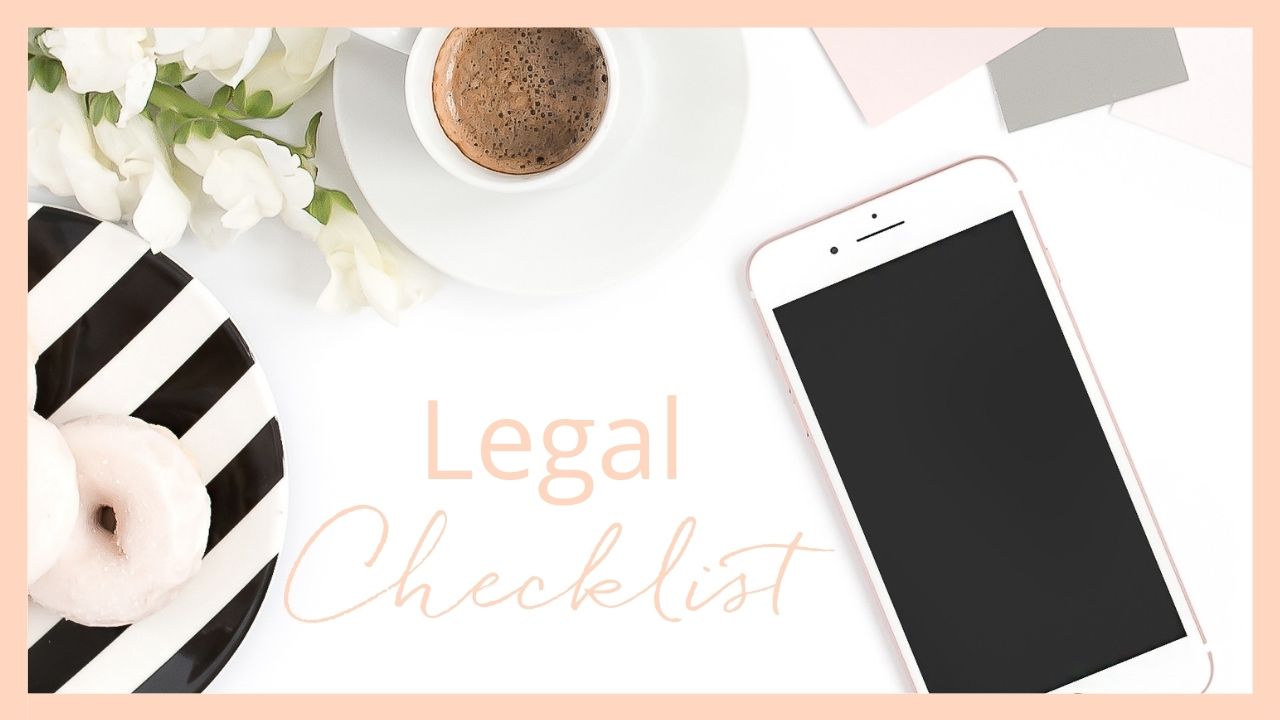
If you’re an entrepreneur or business owner of any kind, chances are you work with clients in some capacity, and if you do, one of the main documents you need is your CLIENT AGREEMENT! This is not something you can take lightly, copy from someone else, or think you’ll deal with later, once you have more money to invest in an attorney.
If you think about it – what is the agreement you and your client have? How much is he/she paying you? What are the terms? What if something goes wrong – is there a signed, legal document in place that will ensure you AND your business are protected?
I have seen this problem way too many times – new business owners complete a discovery call with a prospective client, and after the call, feel like they know the client and can trust them. Additionally, they assume their client perfectly understands what is included in the package or program, and don’t consider the possibility that somewhere along the line, something may go wrong! I know we don’t like to think about something going wrong, and I don’t mean to scare you with this thought, but it is something that is hugely important to the well-being of your business, and just good practice overall to have a signed document in place BEFORE you start working with ANY client!
Now, you may be saying “I know that Christy, but I’m covered because my coach told me I could copy her Client Agreement!”
…STOP RIGHT THERE! There are two main issues with this plan:
First: Her Agreement may not cover what you need in YOUR Agreement: As yourself a few questions: what type of coach is your coach? Does her agreement cover everything you need in yours? For example, let’s say she’s a business coach – her agreement will be geared toward this type of business, and will ensure the agreement covers HER business. What if you are a health coach, or specialize in building websites for new entrepreneurs? The issues that will come up, and the items you need in your Agreement would be somewhat different from your coach!
Second: Who Drafted Her Agreement? This is potentially a bigger issue, as it could expose you to legal issues and liability. Who drafted your coach’s agreement? Chances are – it wasn’t her; most likely, it was an attorney she hired to make sure her business was covered. The problem here? Because she didn’t draft the agreement, she doesn’t have the ability to give you permission to use it. And because she doesn’t have this authority, you don’t’ have permission to use it…meaning you are committing copyright infringement each time you use this document!! I won’t go too far into the legal issues here, but take my word for it that this is NOT a good idea. If the drafter of the agreement has registered this contract as copyrighted material, you could automatically be on the hook for a LARGE amount of money, or “damages” owed to the drafter.
Now that we’ve addressed why you can’t use someone else’s agreement…what are the top 5 things YOUR agreement needs?
- Program Outline
One of the main purposes of having a client agreement in place is to provide transparency and clarity between you and your client as to the scope of the agreement, and what is included in your program or package she or he is purchasing. What does working with you include? Does your client get phone calls? Unlimited email access? Are there modules and workbooks to follow? Does she get access to a membership site that will act as a portal to all the material included in the program? As the coach, this information may all seem obvious to you, since you are the one who came up with the program, and most likely you had some type of discovery or clarity call with this client where this was explained. BUT – you don’t want to risk this, or assume your client is 100% clear on the program just from the phone call. She may have been distracted, or may have written something down incorrectly, leading her to believe your program includes something it doesn’t.
This is where many client relationships go south – misunderstandings about what is/isn’t included in a purchased program. BUT, if everything is perfectly laid out in a client agreement prior to your client issuing payment, she has another opportunity to read and understand everything that is (and isn’t!) included in your program she is planning to purchase. If she has any questions, concerns, or issues, THIS is the time she will bring them up, and you can address them before you start working together.
- Payment Plan or Schedule
The second most common way client relationships go south? Money. Maybe you agreed to a payment plan with your client, but didn’t clearly map out when payments were to be issued and when, and you didn’t get a credit card number to automatically deduct payment from each month. If there is no clear plan on how your client will pay the agreed upon installments, or if this isn’t clear, there is a good chance something will go wrong. And if you don’t have it clearly stated in writing…you may not be able to do anything to require her to complete payment as planned. This can cause you to lose money in your business, and can add a TON of unnecessary stress and headache.
A great plan here is to include all payment information in your agreement, and attach a separate, detailed Payment Plan or Payment Schedule to the agreement, which specifically maps out when payment is due, how much is to be paid on each date, consequences of paying late or failing to pay, and allowing automatic deduction of the client’s owed payment each month with a credit card on file.
- Clearly Stated Refund Policy
This is another hot topic – what is your refund policy? Is it okay to tell clients you don’t offer refunds at all? Do you need to offer refunds? The best answer I can give to these questions is that it is totally up to you! If you feel best not offering refunds, you can absolutely state that in your agreement! More often than not, coaches and consultants do not offer refunds, or offer a very limited window of refunds (such as a 30-day money back guarantee) in case a client is not satisfied with the program.
One great strategy here is to include the strictest language in your agreement (e.g. stating you do not offer refunds), knowing you would always have the option to make a one-time exception if a client encountered an emergency or was otherwise unable to complete the program, and you wanted to offer them a refund. However, if you include in your agreement that you offer refunds, you will have a much more difficult time refusing a refund from someone, since it was already stated that you offer them.
- Dispute Resolution
As you know, one of the wonderful parts about being an online business owner is the ability to reach and work with people all over the world! However, this can create a bit of a snag should there be any sort of claim or controversy with a current or former client, where he or she wishes to take legal action against your company. Although we hate to think of this happening, in the unlikely event it does, where would the claim be filed?
Let’s say your client lives in Spain, and you are in California. Naturally, your client would file the claim in Spain, as it’s convenient for her, and she knows the local laws. Although you are likely a California business, if your website is viewable in Spain and you had the requisite “minimum contacts” required by law, there’s a very real possibility you would be required to go to Spain to defend yourself in that claim. (Not to mention hire local counsel, learn the laws, possibly learn the language, etc.) …sounds like a huge financial strain and stressor, no? Who wants that??
So how do we prevent it? The Dispute Resolution Paragraph. This is the portion of your contract where it states that the contract operates under the laws of your state/country, and any and all disputes are to be resolved via a local court (or arbitration) in your state/country. Your client agrees to this when they sign your agreement, and as such, are bound to it should a dispute occur.
- Intellectual Property Protection
Last but certainly not least, another important piece of the client agreement is the ability to protect the content you provide to your client, once you start working together. Depending on what kind of work you do and what people hire you for, this could be informational worksheets, handouts, modules, verbal instruction you’ve given them on certain processes, marketing structures or processes, etc. Anything protectable under intellectual property laws should be addressed here. The important piece of this paragraph is to let your clients know (in the legal world “put them on notice”) that everything you share with them is your content, and not available for them to redistribute, sell, or share without your written permission. This could come up as an innocent mistake – say your client learns something incredible from you that creates success in her business! She likely would want to share that information with her clients, members of her Facebook community, etc. because she is excited, and wants to help others. Even though it’s coming from an innocent place, however, we need her to know she is not able to take your work (that she became privy to by paying you!) and share it with others who have not enrolled in your program.
Overall, the client agreement is an extremely important legal document to have in place as soon as you start taking on clients. And as we talked about – not one you have drafted yourself, stolen from someone else, or tried to piece together using bits of other agreements that may or may not be related to the kind of work you do. This is your business! Your livelihood! And it’s absolutely important and necessary to invest in protecting how you work with your clients.
Need a client agreement? I’ve got you covered HERE.
Grab my FREE Legal Checklist to see if Your Business is Legally Compliant!

